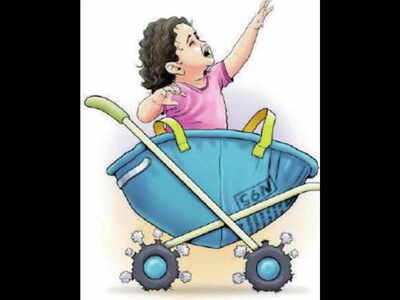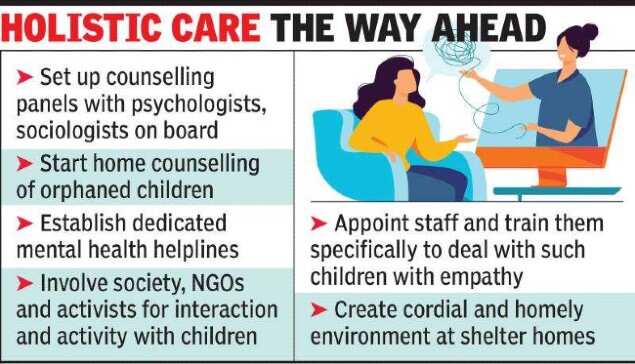- News
- City News
- lucknow News
- Catharsis, healing touch can bring back Covid orphans
Catharsis, healing touch can bring back Covid orphans

Representative image
LUCKNOW: Ten-year-old Vedika (name changed on request) lost her mother to Covid-19 earlier this year but she did not grieve, let out her emotions or talk to the other family members for several days.
When taken for counselling, she told her psychologist that it would worry her mother if she cried. She said her mother was still around and called her at night. Finally, she let out her emotions in the form of tears but only in the third counselling session.

Many like Vedika have lost one or both their parents to Covid-19 in such a manner that they could not even bid them farewell and find closure to the grief. These children are still struggling and so are their families which have no clue on how to deal with children stuck in such a situation.
Recently, UP government initiated a policy to take the children orphaned during the pandemic under its wings and help them with education, money and accommodation at shelter homes. Experts believe the children’s wellbeing and growth depends on their psychological, social and holistic care, for which the entire society should come forward.
“Earlier, there was post-traumatic stress disorder (PTSD) but now there are instances of post-Covid stress disorder (PCSD) which is affecting all, especially children. Previously, the age at which one caught depression was 16 but it has now come down to 10-11 years. Keeping these factors in mind, the government should come up with psychological, social and emotional development of these children,” said counselling psychologist Neha Anand who is also involved with Mission Shakti and UNICEF. “Most children are in formative years and if their emotional needs are not fulfiled, their communication skills will get affected, their self-confidence will depreciate and they may become delinquent. Counselling should be the first step towards catharsis so that they start talking. Psychometric analysis should be done where clinical psychologists would come into play and if medication is required psychotherapy and psychiatrists should be roped in,” she added. She suggested a dedicated mental helpline for counselling of orphaned children.
Member of Child Welfare Committee (CWC) Sangeeta Sharma said between May and June, CWC received around 65 phone calls from families requiring help in communication with orphaned children. “We need to understand that these children used to live with their parents so they need to be taken into a similar environment with kindness and politeness. They are victims of trauma and we could lose them if we put them in regular shelter homes,” she said.
Sharma said the staff for these dedicated shelter homes should be chosen meticulously and trained in dealing with empathy. “They can’t take it as another job. Individuals from the society should also be allowed to interact with these children. Social workers, NGOs and activists who already work with children should be included in this network so that the transition for them is smooth and they can grow as well rounded individuals,” she added. UP State Commission for Protection of Child Rights (UPSCPCR) believes that immediate counselling along with economic help is the way forward for children.
“We have been discussing the role of psychologists, sociologists and counselling in our internal meetings. We will put up a proposal before district level committees for constitution of a panel for counselling,” said UPSCPCR chairperson Vishesh Gupta.
When taken for counselling, she told her psychologist that it would worry her mother if she cried. She said her mother was still around and called her at night. Finally, she let out her emotions in the form of tears but only in the third counselling session.

Many like Vedika have lost one or both their parents to Covid-19 in such a manner that they could not even bid them farewell and find closure to the grief. These children are still struggling and so are their families which have no clue on how to deal with children stuck in such a situation.
Recently, UP government initiated a policy to take the children orphaned during the pandemic under its wings and help them with education, money and accommodation at shelter homes. Experts believe the children’s wellbeing and growth depends on their psychological, social and holistic care, for which the entire society should come forward.
“Earlier, there was post-traumatic stress disorder (PTSD) but now there are instances of post-Covid stress disorder (PCSD) which is affecting all, especially children. Previously, the age at which one caught depression was 16 but it has now come down to 10-11 years. Keeping these factors in mind, the government should come up with psychological, social and emotional development of these children,” said counselling psychologist Neha Anand who is also involved with Mission Shakti and UNICEF. “Most children are in formative years and if their emotional needs are not fulfiled, their communication skills will get affected, their self-confidence will depreciate and they may become delinquent. Counselling should be the first step towards catharsis so that they start talking. Psychometric analysis should be done where clinical psychologists would come into play and if medication is required psychotherapy and psychiatrists should be roped in,” she added. She suggested a dedicated mental helpline for counselling of orphaned children.
Member of Child Welfare Committee (CWC) Sangeeta Sharma said between May and June, CWC received around 65 phone calls from families requiring help in communication with orphaned children. “We need to understand that these children used to live with their parents so they need to be taken into a similar environment with kindness and politeness. They are victims of trauma and we could lose them if we put them in regular shelter homes,” she said.
Sharma said the staff for these dedicated shelter homes should be chosen meticulously and trained in dealing with empathy. “They can’t take it as another job. Individuals from the society should also be allowed to interact with these children. Social workers, NGOs and activists who already work with children should be included in this network so that the transition for them is smooth and they can grow as well rounded individuals,” she added. UP State Commission for Protection of Child Rights (UPSCPCR) believes that immediate counselling along with economic help is the way forward for children.
“We have been discussing the role of psychologists, sociologists and counselling in our internal meetings. We will put up a proposal before district level committees for constitution of a panel for counselling,” said UPSCPCR chairperson Vishesh Gupta.
FacebookTwitterLinkedinEMail
Start a Conversation
end of article
Quick Links
Delhi Air PollutionDelhi TemperatureChennai WeatherBangalore TemperatureCovid vaccination centres in DelhiCoronavirus in DelhiRTPCR test in GurgaonHyderabad RainPollution level in BangaloreDelhi SmogDelhi TemperatureNoida AQIGurgaon AQI todayFire in MumbaiMumbai RainsCovid 19 RT PCR Test in NoidaDelhi AQI todaySrinagar encounter
